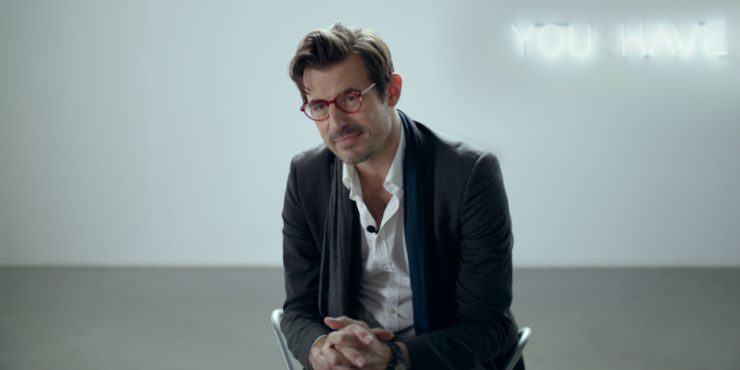The kind of satire that Ruben Östlund is doing with his 2014 film Force Majeure and his newest film, The Square, strikes right at the heart of contemporary society. Force Majeure dissected the state of the standard binary family in a world where gender definitions are becoming hazier and hazier. The Square feels a bit grander in a way, more encompassing. Its view is broader, its teeth sharper. At the center of The Square is a major Swedish modern art museum, The X-Royal, and its new exhibition, called “The Square”, meant to preach a safe space, a utopian concept of acceptance and self-responsibility. It’s meant to speak toward the better angels of our nature, to show the goodness of humanity in a world filled with chaos. Östlund’s film shows the absurdity of this particular museum showing this piece of art with a straight face. The Square then finds a home within that absurdity, introducing us to many characters who have managed to turn pretension into a profession.
Claes Bang plays Christian, the dashing, charming chief curator of The X-Royal, who loves art but loves his lifestyle – which his position in the art world has afforded him – even more. Early in the film, he is being interviewed by a journalist named Anne (Elisabeth Moss) and he explains the function the museum plays in Swedish society. His elliptical monologue quickly spins into art itself and as his words and phrases become more and more vague, Anne (and the audience) can see that we’re in the hands of a pro. Unveiling “The Square” falls under Christian’s jurisdiction, and as the museum outsources their marketing campaign, Christian finds himself highly distracted by a situation that punctures his bubble of esteem and prestige. Östlund’s script is so surprising in how it unveils its plot points that it would be a shame to go over most of them here. Suffice to say, Christian spends much of The Square at a level of discomfort that he’s not totally used to.
On the surface, The Square is a very manneristic satire of the modern art world, but the film takes on much broader contexts of class and race with a bite so fierce that not even all of the laughter can hide the teeth marks. The film so markedly pinpoints the dichotomy within the art audience. Their simultaneous enchantment and repulsion of the poor, their structuring of the conversation, built to keep those unwelcome outside the club. Christian and the other museum employees in this film prop up “The Square” as a symbol of unity and peace. This ethos runs so contradictory to the behavior of these people, it requires a belief in two separate realities, and The Square is a near perfect presentation of the kind of people who can choose to have that belief.
Of course, these kinds of films can be tricky, often becoming the very kind of withholding artwork that the film itself is skewering. Who else would the audience for The Square be other than the museum-patroning classists that the story so ferociously roasts? This movie is so smart in the way it alludes that contradiction. It does not seek to avoid that criticism, but embraces it. Östlund’s typical long takes stay on faces as they listen. He is obsessed with reactions, and those reactions are usually of the eye-roll variety. In the film’s seminal scene, an X-Royal performer named Oleg (famed motion-capture performer Terry Notary) acts like an ape with uncanny likeness in the middle of an opulent dining room filled with dignified diners. Notary no doubt honed this skill by performing in the new Planet of the Apes films. Oleg’s animalistic qualities at first impresses the audience, then it shocks them, then it scares them, and then finally the audience is forced to admit their disgust. It’s one of the most powerful scenes I’ve seen in a movie this year.
Claes Bang’s performance of Christian is 90% handsomeness, but Bang is smart enough to fill out the other aspects too. Much like Christian himself, Bang knows that looking the part is a lot more than simply looking like the part. With The Square‘s grand themes, it might be surprising that the film is mostly a character study of Christian, and his own journey toward discovering his own odiousness and lack of accountability. The film reminded me of Fellini’s La Dolce Vita, another exceedingly long film that sliced open the shallowness of a supposedly rich society. In both films, the characters are completely consumed by their artifice, so entirely detached from the practical problems of the real world. Even the practical problems of Christian’s own life, he is able to avoid trouble with alcohol, his Tesla car and anxiety-ridden casual sex. The Square warns us against a tide of high-mindedness, against a culture that values interpretation over reality, that matter-of-factly values the rich over the poor. And it delivers that warning in such an incredibly funny way.
Written and Directed by Ruben Östlund










